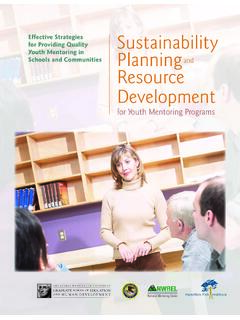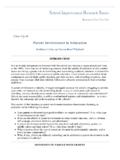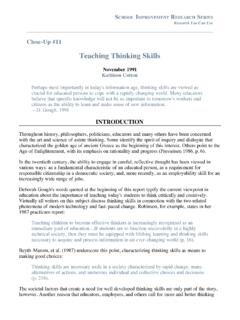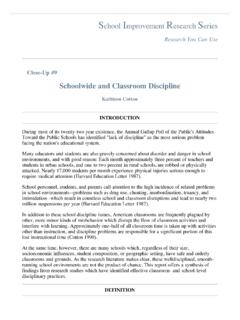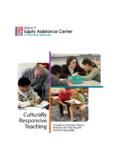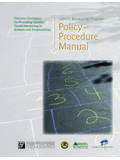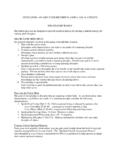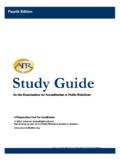Transcription of Training New Mentors - Education Northwest
1 Effective Strategies for Providing Quality Youth mentoring in Schools and CommunitiesTraining NewMentorsNational mentoring CenterThis publication contains pages that have been left intentionally blank for proper pagination when September 2007 Published by: The Hamilton Fish Institute on School and Community Violence &The National mentoring Center at Northwest Regional Educational LaboratoryWith support from:Office of Juvenile Justice and Delinquency Prevention, Department of JusticeYouth mentoring in Schools and Communities MentorsMentorsEffective Strategies for Providing Quality Training NewTraining New Hamilton Fish Institute on School and Community ViolenceThe George Washington University2121 K Street NW, Suite 200, Washington, DC 20037-1830Ph: (202) 496-2200E-mail: Fish Institute Director: Dr.
2 Beverly Caffee GlennNational mentoring CenterNorthwest Regional Educational Laboratory101 SW Main St., Suite 500, Portland, OR 97204 Toll-free number: 1-800-547-6339, ext. 135E-mail: mentoring Center Director: Eve McDermottContributing Authors:Amy Cannata, Michael Garringer, Christian Rummell, Elsy Arevalo, and Linda JucovyEditor:Michael GarringerTechnical editor: Eugenia Cooper PotterLayout design:Dennis Wakeland and Michael GarringerCover design:Paula Surmann 2008, National mentoring CenterAll Rights Reserved This project was supported by the Hamilton Fish Institute on School and Community Violence through Award No. 2005-JL-FX-0157 awarded by the Office of Juvenile Justice and Delinquency Prevention, Office of Justice Programs, Department of Justice.
3 Points of view or opinions in this document are those of the author and do not necessarily represent the official position or policies of the Department of Justice or the Hamilton Fish the Effective Strategies for Providing Quality Youth mentoring in Schools and Communities SeriesMentoring is an increasingly popular way of providing guidance and support to young people in need. Recent years have seen youth men-toring expand from a relatively small youth intervention (usually for youth from single-parent homes) to a cornerstone youth service that is being implemented in schools, community centers, faith institutions, school-to-work programs, and a wide variety of other youth-serving institutions.
4 While almost any child can benefit from the magic of mentoring , those who design and implement mentoring programs also need guidance and support. Running an effective mentoring program is not easy, and there are many nuances and programmatic details that can have a big impact on outcomes for youth. Recent mentoring research even indi-cates that a short-lived, less-than-positive mentoring relationship (a hallmark of programs that are not well designed) can actually have a negative impact on participating youth. mentoring is very much worth doing, but it is imperative that programs implement proven, research-based best practices if they are to achieve their desired outcomes.
5 That s where this series of publications can Effective Strategies for Providing Quality Youth mentoring in Schools and Communities series, sponsored by the Hamilton Fish Institute on School and Community Violence, is designed to give practitioners a set of tools and ideas that they can use to build qual-ity mentoring programs. Each title in the series is based on research (primarily from the esteemed Public/Private Ventures) and observed best practices from the field of mentoring , resulting in a collection of proven strategies, techniques, and program structures. Revised and updated by the National mentoring Center at the Northwest Regional Educational Laboratory, each book in this series provides insight into a critical area of mentor program development:Foundations of Successful Youth mentoring This title offers a compre-hensive overview of the characteristics of successful youth mentoring programs.
6 Originally designed for a community-based model, its advice and planning tools can be adapted for use in other mentoring Program Policy and Procedure Manual Much of the success of a mentoring program is dependent on the structure and consistency of service delivery, and this guide provides advice and a customizable template for creating an operations manual for a local mentoring program. Training New Mentors All Mentors need thorough Training if they are to possess the skills, attitudes, and activity ideas needed to effectively mentor a young person. This guide provides ready-to-use Training modules for your program. The ABCs of School-Based mentoring This guide explores the nuances of building a program in a school Relationships: A Guide for New Mentors This resource is writ-ten directly for Mentors , providing them with 10 simple rules for being a successful mentor and quotes from actual volunteers and youth on what they have learned from the mentoring experience.
7 Sustainability Planning and Resource Development for Youth mentoring Programs mentoring programs must plan effectively for their sustain-ability if they are to provide services for the long run in their com-munity. This guide explores key planning and fundraising strategies specifically for youth mentoring programs. The Hamilton Fish Institute and the National mentoring Center hope that the guides in this series help you and your program s stakeholders design effective, sustainable mentoring services that can bring positive direction and change to the young people you serve. AcknowledgmentsThe original Training New Mentors was written by Linda Jucovy, who thanks a number of people who made valuable contributions to that earlier version, including Andrea Baker, formerly of the Northwest Regional Educational Laboratory (NWREL), Susan Weinberger of the mentor Consulting Group, and Carrie Askin of Women in Transition.
8 Jean Grossman of Public/Private Ventures (P/PV) also provided feedback on several versions of the Training activities. This new version builds upon Linda s original version by including additional Training activities and advice for program staff on the art of effective Training delivery. The National mentoring Center (NMC)would also like to thank Jean Grossman and Linda Jucovy of Public/Private Ventures (P/PV) for their outstanding work on this and other National mentoring Center publications. We also thank Big Brothers Big Sisters of America for their contributions to the original NMC publications, including this one. Many thanks to Scott Peterson at the Office of Juvenile Justice and Delinquency Prevention, Department of Justice for his support of the NMC and for mentoring in general.
9 Finally, we thank the Hamilton Fish Institute on School and Community Violence at the George Washington University for their support in developing and disseminating this revised pageviiContentsIntroduction .. 1 Tips for Trainers .. 3 Building Your Training Agenda and Script .. 9 Working With Outside Trainers and Experts.. 13 Sample mentor Training Part 1: Program Overview and Introduction to mentoring .. 15 Part 2: Working Effectively with Your Mentee .. 35 Appendix: Additional Reading and Resources .. 65 blank page1 IntroductionIntroductionBecause the relationship between a mentor and young person might seem to be a natural connection, mentoring programs sometimes overlook the importance of Training .
10 But like anyone step-ping into a new role, Mentors are more likely to succeed if they partici-pate in useful Training sessions that prepare them for what lies ahead. To begin developing their Training plans, programs can ask themselves several key questions:Q What information do Mentors need to acquire?Q What skills Training do they need?Q How much Training should be required? Should there be optional trainings, as well?Q When should the trainings take place? Before the mentor and youth first meet? Early in their relationship? Ongoing through-out their mentoring experience?The following material focuses on Training new Mentors , and includes suggested activities for an initial Training and program overview that adds up to about six hours of Training .


